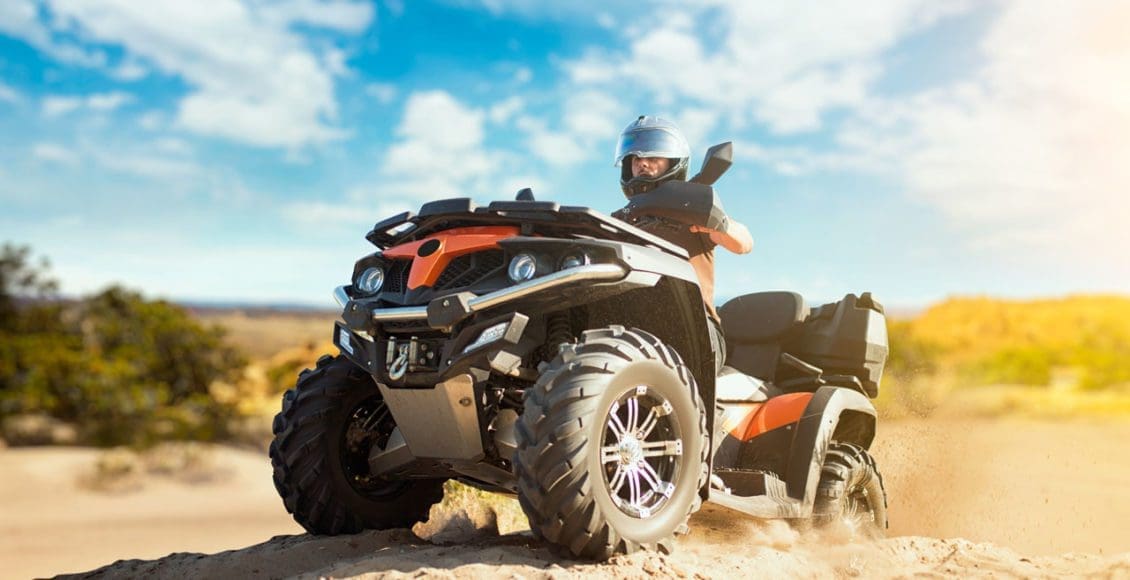Many individuals enjoy riding all-terrain vehicles, or ATVs. It is a fun pastime and it gets individuals outdoors. However, when driving/riding any type of motor vehicle there is potential for crashes and accidents that can result in severe injuries. Unfortunately, many individuals get on an ATV without properly understanding how the vehicle operates, safety measures, and what to do in an emergency. Several facts about ATV accidents, provided by the Consumer Product Safety Commission:
- 130,000+ individuals are injured every year from ATV accidents
- Over 700 individuals are killed in these accidents every year
- Around one-third of the individuals killed are under the age of 16.
- Many of the accidents could have been prevented if proper safety protocols were followed
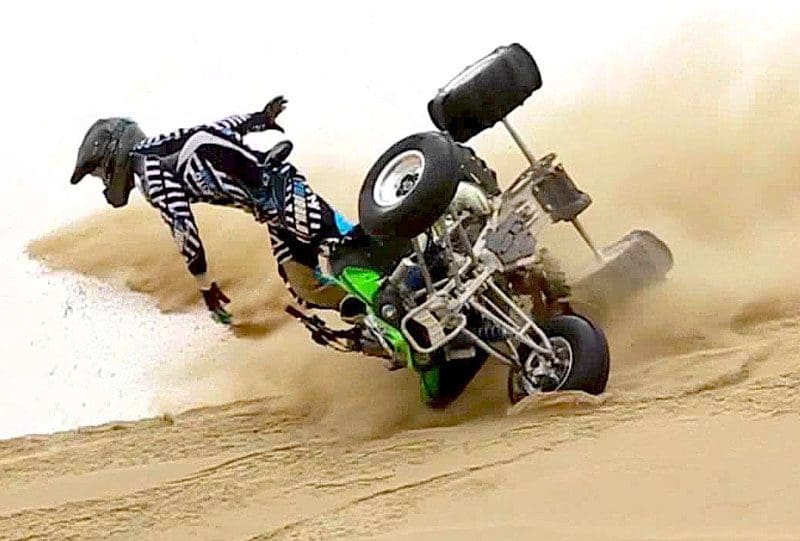
Many of these accidents are based on negligence or recklessness of the driver or other individual/s doing the same in close proximity. The causes range from:
- Speeding recklessly
- Steep hill-climbing
- Rollovers
- Drunk driving
- Exceeding capacity
Many of these vehicles are designed to hold one passenger only. When a second or third passenger is on the vehicle, the accidents are usually of the secondary passengers falling or getting thrown off. In other cases, the passenger is not able to shift their weight with the driver, resulting in throwing the entire vehicle off-balance.
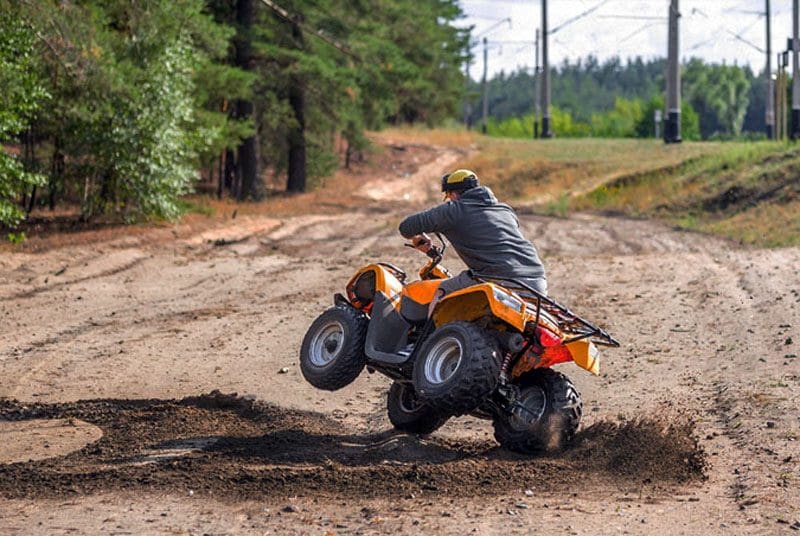
Table of Contents
ATV
Today ATVs are used for various jobs including border patrol, construction, emergency medical response, snow plowing, and maintaining farmland. They can be fun, but they can also be extremely dangerous if not properly ridden. Every year faster, and more powerful ATVs arrive on the market for purchase. The first ATVs had around 7-horsepower, an 89 cc engine, and weighed about 200 pounds. Today, some have engines that are 600 ccs, with 50 horsepower, weigh over 400 pounds, and can go up to 100 miles per hour. These are powerful machines that can cause severe injuries.
- Injuries typically happen to men around 18 to 30 years of age
- 80 percent of injuries impact the driver and not the passenger
- The most common injury cause is associated with flips and/or rolls
- When this happens, both the driver and passenger can get thrown and in some cases, pinned underneath.
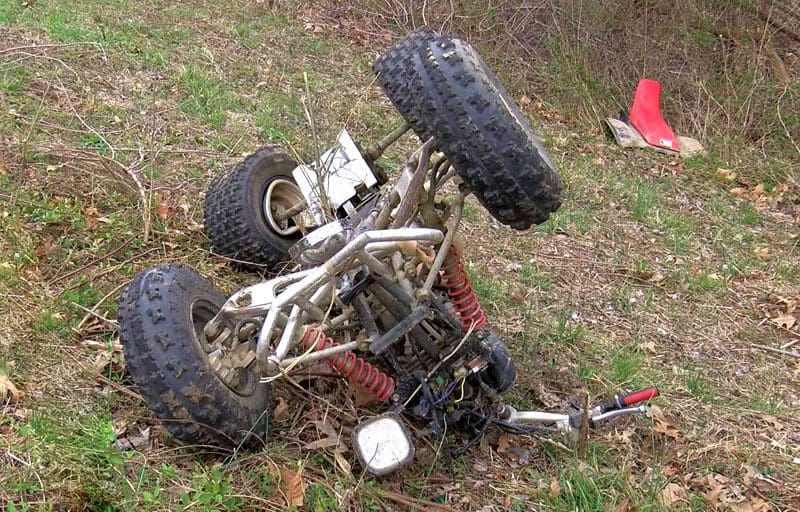
Symptoms and Injuries
Common ATV injuries include:
- All around body pain
- Muscle stiffness
- Fractures
- Broken bones
- Dislocation/s
- Whiplash
- Headaches
- Migraines
- Concussion
- Neurologic injuries
- Spinal cord damage
- Chronic pain
- Blurred Vision
Chiropractic and Physical Therapy
Just like automobile accident injuries, there can be delayed symptoms that begin to present over days or weeks. Seeking the proper treatment as soon as possible is important to decrease inflammation and swelling before the injury/s worsens, or leads to other debilitating conditions. Injury Medical Chiropractic and Functional Medicine Clinic can help restore mobility and flexibility after an ATV accident. A combination of physical therapy, chiropractic adjustments, and massage will help with:
- Accelerated recovery
- Decrease in chronic symptoms
- Injury rehabilitation
- Further injury/damage prevention
- Maintaining a level of improved function
- Acute and chronic pain alleviation
- Range of motion increase
- Overall health and wellness
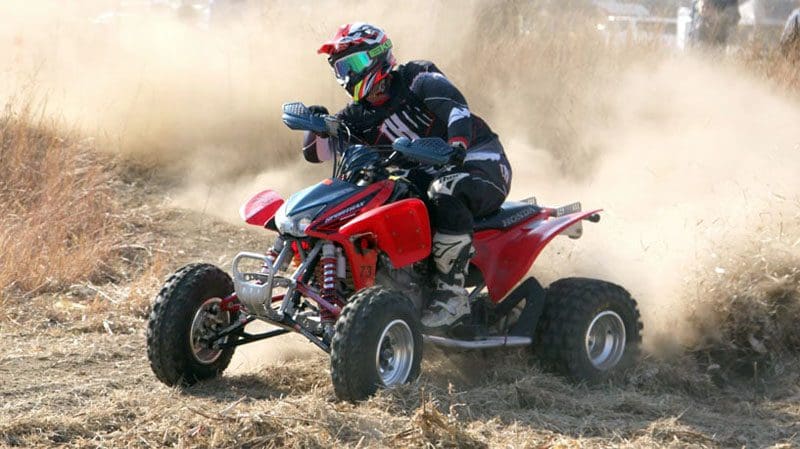
Operation Safety Tips
- Always wear a DOT-approved helmet, proper footwear, and safety gear
- Make sure that all drivers are educated and understand how to operate the ATV
- Read the operating manual, watch safety videos
- Know the vehicle’s limitations
- Know the terrain where it will be driven
- Check and know local and state regulations
- Never let young children operate the vehicle
- Never drive under the influence
- Keep a phone or other communication device in case of an emergency
Body Composition
Phase Angle values can determine what’s going on in the body
It can help identify health risks, address underlying health issues, and track the progress of lifestyle changes like diet and exercise. For many individuals phase angle analysis has helped them make data-driven health and wellness decisions. Many medical practices are using it to personalize a patient’s treatment plan. Lifestyle factors that are likely to impact phase angle include:
- Injuries
- Eating highly processed meals
- Lack of quality sleep
- Stress – physical, mental, and emotional
- Lack of regular physical activity
- Excess caffeine, alcohol, and refined sugars
- Toxicity exposure
Disclaimer
The information herein is not intended to replace a one-on-one relationship with a qualified health care professional, licensed physician, and is not medical advice. We encourage you to make your own health care decisions based on your research and partnership with a qualified health care professional. Our information scope is limited to chiropractic, musculoskeletal, physical medicines, wellness, sensitive health issues, functional medicine articles, topics, and discussions. We provide and present clinical collaboration with specialists from a wide array of disciplines. Each specialist is governed by their professional scope of practice and their jurisdiction of licensure. We use functional health & wellness protocols to treat and support care for the musculoskeletal system’s injuries or disorders. Our videos, posts, topics, subjects, and insights cover clinical matters, issues, and topics that relate to and support, directly or indirectly, our clinical scope of practice.* Our office has made a reasonable attempt to provide supportive citations and has identified the relevant research study or studies supporting our posts. We provide copies of supporting research studies available to regulatory boards and the public upon request. We understand that we cover matters that require an additional explanation of how it may assist in a particular care plan or treatment protocol; therefore, to further discuss the subject matter above, please feel free to ask Dr. Alex Jimenez or contact us at 915-850-0900.
Dr. Alex Jimenez DC, MSACP, CCST, IFMCP, CIFM, CTG*
email: coach@elpasofunctionalmedicine.com
phone: 915-850-0900
Licensed in Texas & New Mexico
References
Spine Trauma. The Anand Spine Group Web site. http://www.infospine.net/condition-spine-trauma.html. Accessed October 18, 2018.
Wilberger JE, Mao G. Spinal Trauma. Merck Manual Professional Version. https://www.merckmanuals.com/professional/injuries-poisoning/spinal-trauma/spinal-trauma. Last reviewed November 2017. Accessed October 18, 2018.
Pelvic Fracture. Cedars-Sinai Web site. https://www.cedars-sinai.org/health-library/diseases-and-conditions/p/pelvic-fracture.html. Accessed October 18, 2018.
Post Disclaimer
Professional Scope of Practice *
The information on this blog site is not intended to replace a one-on-one relationship with a qualified healthcare professional or licensed physician and is not medical advice. We encourage you to make healthcare decisions based on your research and partnership with a qualified healthcare professional.
Blog Information & Scope Discussions
Welcome to El Paso's Premier Wellness and Injury Care Clinic & Wellness Blog, where Dr. Alex Jimenez, DC, FNP-C, a board-certified Family Practice Nurse Practitioner (FNP-BC) and Chiropractor (DC), presents insights on how our team is dedicated to holistic healing and personalized care. Our practice aligns with evidence-based treatment protocols inspired by integrative medicine principles, similar to those found on this site and our family practice-based chiromed.com site, focusing on restoring health naturally for patients of all ages.
Our areas of chiropractic practice include Wellness & Nutrition, Chronic Pain, Personal Injury, Auto Accident Care, Work Injuries, Back Injury, Low Back Pain, Neck Pain, Migraine Headaches, Sports Injuries, Severe Sciatica, Scoliosis, Complex Herniated Discs, Fibromyalgia, Chronic Pain, Complex Injuries, Stress Management, Functional Medicine Treatments, and in-scope care protocols.
Our information scope is limited to chiropractic, musculoskeletal, physical medicine, wellness, contributing etiological viscerosomatic disturbances within clinical presentations, associated somato-visceral reflex clinical dynamics, subluxation complexes, sensitive health issues, and functional medicine articles, topics, and discussions.
We provide and present clinical collaboration with specialists from various disciplines. Each specialist is governed by their professional scope of practice and their jurisdiction of licensure. We use functional health & wellness protocols to treat and support care for the injuries or disorders of the musculoskeletal system.
Our videos, posts, topics, subjects, and insights cover clinical matters and issues that relate to and directly or indirectly support our clinical scope of practice.*
Our office has made a reasonable effort to provide supportive citations and has identified relevant research studies that support our posts. We provide copies of supporting research studies available to regulatory boards and the public upon request.
We understand that we cover matters that require an additional explanation of how they may assist in a particular care plan or treatment protocol; therefore, to discuss the subject matter above further, please feel free to ask Dr. Alex Jimenez, DC, APRN, FNP-BC, or contact us at 915-850-0900.
We are here to help you and your family.
Blessings
Dr. Alex Jimenez DC, MSACP, APRN, FNP-BC*, CCST, IFMCP, CFMP, ATN
email: coach@elpasofunctionalmedicine.com
Licensed as a Doctor of Chiropractic (DC) in Texas & New Mexico*
Texas DC License # TX5807
New Mexico DC License # NM-DC2182
Licensed as a Registered Nurse (RN*) in Texas & Multistate
Texas RN License # 1191402
ANCC FNP-BC: Board Certified Nurse Practitioner*
Compact Status: Multi-State License: Authorized to Practice in 40 States*
Graduate with Honors: ICHS: MSN-FNP (Family Nurse Practitioner Program)
Degree Granted. Master's in Family Practice MSN Diploma (Cum Laude)
Dr. Alex Jimenez, DC, APRN, FNP-BC*, CFMP, IFMCP, ATN, CCST
My Digital Business Card


